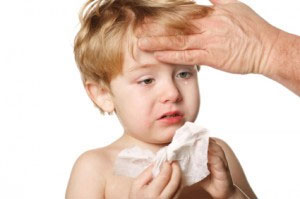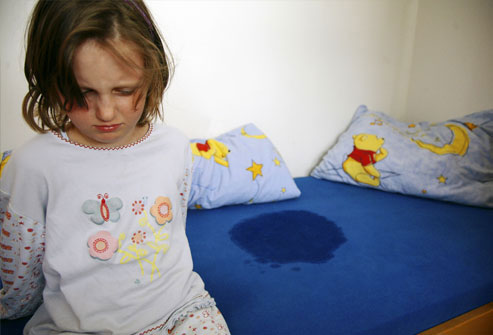Does your child suck his thumb? Read about the dental and emotional issues associated with this habit. In this articleDental problemsEmotional problemsDental problems A persons teeth and facial features develop the most when the person is between the ages of 4 and 14. Dental structures start getting formed from the age of 5, as this is when the permanent teeth slowly start appearing. If your child is still sucking her thumb at this age, she is interfering with the natural growth of her teeth. A strong thumb-sucking habit by a child beyond the age of five can alter the jaw line and cause misalignment of teeth, termed a malocclusion. This can result in what is sometimes referred to as buckteeth or an overbite, where the front teeth are not closed when the back teeth are. Sometimes a cross bite occurs as the back teeth are drawn in as constant sucking narrows the palate. To test the extent of damage caused by thumb sucking, a dental group studied around 400 babies in Iowa, United Stated, until the age of four. The researchers regularly questioned the parents about their childrens thumb sucking habits. After the age of four, models were made of the childrens teeth. Needless to say, the teeth of those kids who stopped sucking their thumb before they turned one were in pretty good shape. Damage to the teeth increased amongst approximately 6% of the kids who stopped sucking their thumb by the age of 2. Crossbite and overbite were more prevalent by 13 percent amongst those kids who stopped thumb sucking between the ages of 2 and 3, and this figure increased to 20 percent, in the group of kids who were still sucking their thumbs. While most of this damage is caused to the childs baby teeth, there is a chance that it will affect the permanent teeth as well - especially if the child continues sucking her thumb after the age of six. Emotional problems The emotional problems involved with thumb sucking can be devastating. School children can be unmerciful with thumb suckers. The best approach for parents is to explain to the child that the habit itself is causing the teasing, and not the childs personality. This way, peer pressure becomes a motivational factor for the child. Parents worry that the trauma resulting from quitting thumb-sucking would be worse than the consequences of continuing the habit. This course of reasoning is understandable, but unfounded. If this were true, the child who quit thumb-sucking would cling more strongly to other comforts such as his security blanket or stuffed animal. The fact is, once thumb sucking stops, the affinity to other comforting items is stopped as well. With the exception of a child who has experienced a severe trauma, thumb-sucking becomes an empty habit. Quitting does not have to be traumatic. If you make your child believe he is leading the process and if you provide positive feedback, he will not feel like he is losing anything. If you threaten or forbid, you will encounter a stubborn rebellion and wage a battle you cannot hope to win. Parents are frequently left with the impression that no harm is done to the teeth. This perspective is based on the assumption that most children stop the sucking behavior before permanent teeth erupt. Therefore, any dental malocclusion in the primary teeth will often be transitional or will spontaneously self-correct. However, as demonstrated by Kelly, et al (1973), millions of children do not discontinue their sucking habits before permanent teeth erupt. In addition, stress levels in todays world are significantly greater than when this study was done. Because stress is a powerful stimulus for the sucking activity, it is highly probable that if a similar study were done today, it would produce a substantially greater number of individuals with prolonged sucking habits. Get information on preventing thumb-sucking.
Does your child suck his thumb? Read about the dental and emotional issues associated with this habit. Dental problems
A person's teeth and facial features develop the most when the person is between the ages of 4 and 14. Dental structures start getting formed from the age of 5, as this is when the permanent teeth slowly start appearing. If your child is still sucking her thumb at this age, she is interfering with the natural growth of her teeth.
A strong thumb-sucking habit by a child beyond the age of five can alter the jaw line and cause misalignment of teeth, termed a malocclusion. This can result in what is sometimes referred to as 'buckteeth' or an
overbite, where the front teeth are not closed when the back teeth are. Sometimes a cross bite occurs as the back teeth are drawn in as constant sucking narrows the palate.
To test the extent of damage caused by thumb sucking, a dental group studied around 400 babies in Iowa, United Stated, until the age of four. The researchers regularly questioned the parents about their children's thumb sucking habits. After the age of four, models were made of the children's teeth.
Needless to say, the teeth of those kids who stopped sucking their thumb before they turned one were in pretty good shape. Damage to the teeth increased amongst approximately 6% of the kids who stopped sucking their thumb by the age of 2. Crossbite and overbite were more prevalent by 13 percent amongst those kids who stopped thumb sucking between the ages of 2 and 3, and this figure increased to 20 percent, in the group of kids who were still sucking their thumbs.
While most of this damage is caused to the child's baby teeth, there is a chance that it will affect the permanent teeth as well - especially if the child continues sucking her thumb after the age of six.
Emotional problems
The emotional problems involved with thumb sucking can be devastating. School children can be unmerciful with thumb suckers. The best approach for parents is to explain to the child that the habit itself is causing the teasing, and not the child's personality. This way, peer pressure becomes a motivational factor for the child.
Parents worry that the trauma resulting from quitting thumb-sucking would be worse than the consequences of continuing the habit. This course of reasoning is understandable, but unfounded. If this were true, the child who quit thumb-sucking would cling more strongly to other comforts such as his security blanket or stuffed animal. The fact is, once thumb sucking stops, the affinity to other comforting items is stopped as well. With the exception of a child who has experienced a severe trauma, thumb-sucking becomes an empty habit.
Quitting does not have to be traumatic. If you make your child believe he is leading the process and if you provide positive feedback, he will not feel like he is losing anything. If you threaten or forbid, you will encounter a stubborn rebellion and wage a battle you cannot hope to win.
Parents are frequently left with the impression that no harm is done to the teeth. This perspective is based on the assumption that most children stop the sucking behavior before permanent teeth erupt. Therefore, any dental malocclusion in the primary teeth will often be transitional or will spontaneously self-correct. However, as demonstrated by Kelly, et al (1973), millions of children do not discontinue their sucking habits before permanent teeth erupt. In addition, stress levels in today's world are significantly greater than when this study was done. Because stress is a powerful stimulus for the sucking activity, it is highly probable that if a similar study were done today, it would produce a substantially greater number of individuals with prolonged sucking habits.
Get information on
preventing thumb-sucking.































